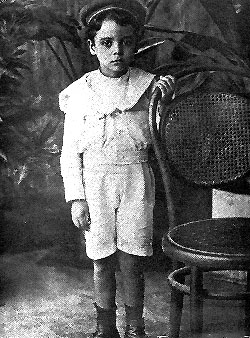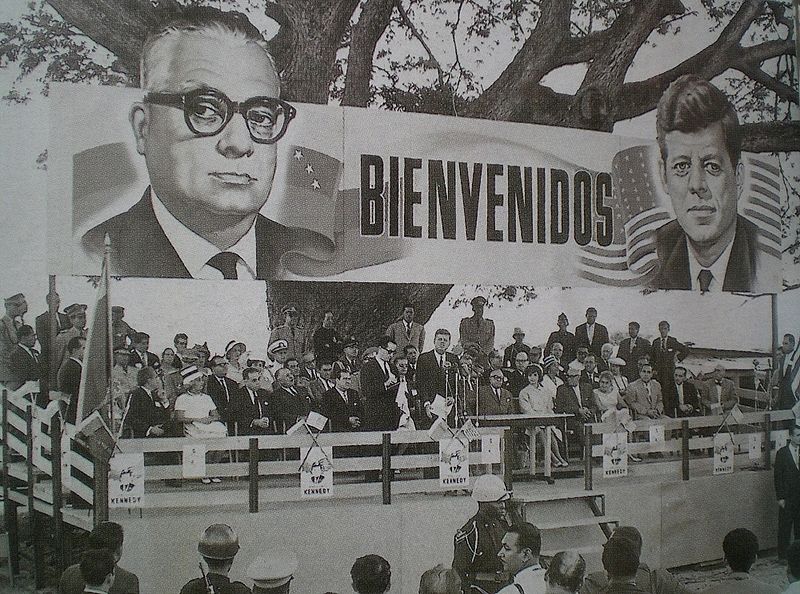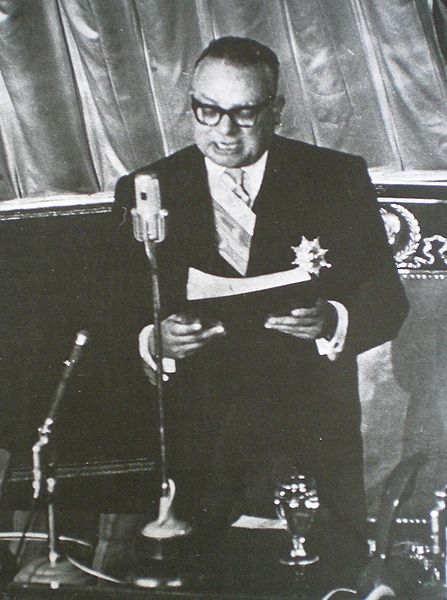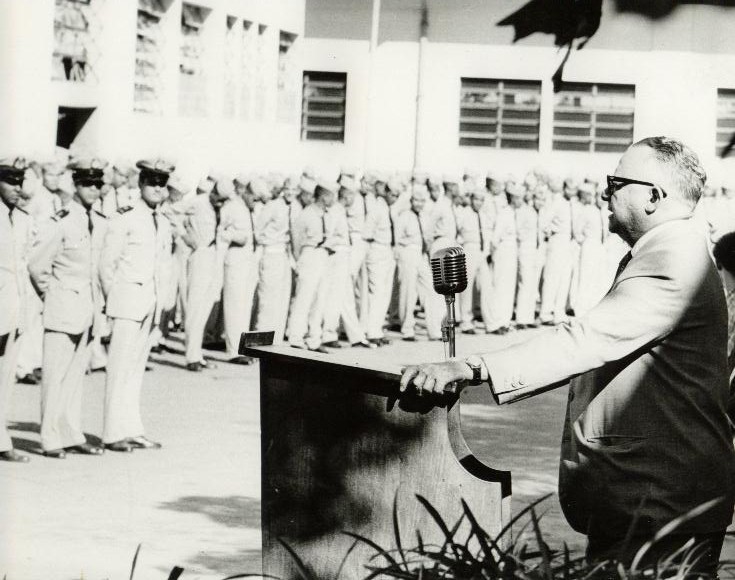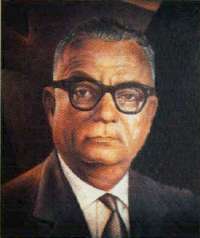<Back to Index>
- Naturalist Peter Artedi, 1705
- Composer João de Sousa Carvalho, 1745
- President of Venezuela Rómulo Ernesto Betancourt Bello, 1908
PAGE SPONSOR
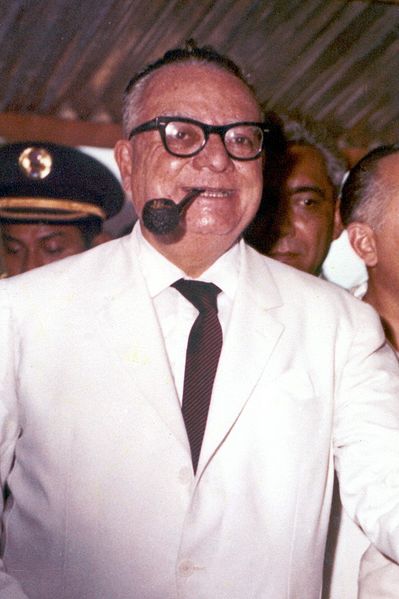
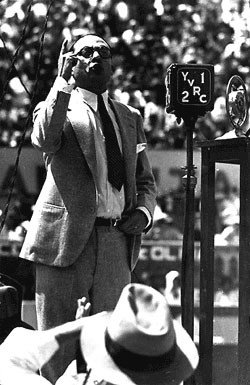
Rómulo Ernesto Betancourt Bello (22 February 1908 – 28 September 1981), known as "The Father of Venezuelan Democracy", was President of Venezuela from 1945 to 1948 and again from 1959 to 1964, as well as leader of Accion Democratica, Venezuela's dominant political party in the 20th century. He survived an assassination attempt ordered by Rafael Trujillo, dictator of the Dominican Republic. Betancourt, one of Venezuela's most important political figures, led a tumultuous and highly controversial career in Latin American politics. Periods of exile brought Betancourt in contact with various Latin American countries as well as the United States, securing his legacy as one of the few real international leaders to emerge from twentieth century Latin America. Scholars credit Betancourt as the Founding Father of modern democratic Venezuela.
Rómulo Betancourt was born in Guatire, a town near Caracas, son of Luis Betancourt Bello (from Canary origins) and Venezuelan Virginia Bello Milano, being the middle brother between his older sister Teresa and younger sister Helena. Living along with his maternal grandmother Maria Milano Bello and his uncle Luis Bello Milano.
From 1914 to 1920 Betancourt began his formal education at a private school created by the community of Guatire and promoted by his own father. In 1921, he moved along with his family to Caracas for high school, graduating from the Liceo Caracas in 1926, the same year that his mother died. In 1927 he entered the law faculty of Central University of Venezuela, earning the first year notable qualifications, working at the legal desk and at the Bar Association of Caracas, having great interest in literature, writing short stories and trying to establish a literary magazine.
The year 1928 can be considered the one of Betancourt's political baptism, becoming a member of the "Generation of 1928". Due to his participation along with other members of the Students' Federation of Venezuela (FEV) presided by Raúl Leoni, in the events of students week (February 1928), which had as its original goal to generate funds for the construction of a Students' house. Later assumed to be a protest against the dictatorship of Juan Vicente Gómez, culminating in the incarceration of this group of young leaders and their subsequent transferring to the Libertador castle of Puerto Cabello.
Imprisonment lasted only two months through the intervention of respected citizens who advocated for the students' freedom. But this period of forced incarceration in shackles, where not all his student colleagues survived, marked Betancourt as a justice and democracy fighter. On 7 April 1928 shortly after these events, a military conspiracy exploded that earned broad student support seizing the headquarters of Miraflores Palace, but failed in an attempt to capture San Carlos' military barracks. Betancourt, who was involved in the uprising, managed to leave the country for the island of Curaçao beginning his first exile. One that would last until late 1936.
While in Curaçao, Betancourt came in contact with many other young Venezuelan exiles, who like him, worked actively against Gómez's repressive regime, joining the Venezuelan Revolutionary Party (PRV) and devoting his time to the study of Latin American and Venezuelan history, socialist doctrine related to imperialist penetration in Latin American countries and the oil business. These studies were later going to define much of Betancourt's controversial political life; marking his eventual passage from prisoner to president.
In 1929, he went to Santo Domingo joining an exile group who wanted to sail to the island of La Blanquilla, in order to join the expedition aboard the cruiser Falke commanded by Román Delgado Chalbaud, trying to land at Cumaná with the intention of overthrowing Gómez. After this insurrection failed, Betancourt traveled to Costa Rica, where he met his future wife, Carmen Valverde. In this Central American nation he founded, and led, a number of radical and Communist student groups. In the early 1930s, while in Costa Rica, he became at the young age of 22, the leader of that country's Communist Party. In
1937, after resigning the Communist Party and returning to his native
Venezuela, Betancourt founded Partido Democrático Nacional,
which became an official political party in 1941 as Acción Democrática (AD).
Betancourt became president in 1945 by means of a military coup d'état and, during his time in office, completed an impressive agenda. His accomplishments included the declaration of universal suffrage, the institution of social reforms, and securing half of the profits generated by foreign oil companies for Venezuela. His government worked closely with the International Refugee Organization to aid European refugees and displaced persons who could not or would not return home after World War II; his government assumed responsibility for the legal protection and resettlement of tens of thousands of refugees inside Venezuela. The refugee initiative was the subject of great controversies within his government with the winning side led by Betancourt's secretary of Agriculture, Eduardo Mendoza. Betancourt transferred power to his old teacher, the novelist Rómulo Gallegos (who was the first Venezuelan president elected by direct and universal suffrage), being appointed by the latter to head the Venezuelan Delegation to the IX Inter American Conference to be held in Bogotá, in 1948. Betancourt, was one of the writers of the Constitutive Charter of the OAS. During an address delivered at this Conference, on 6 April 1948, proclaimed:
"...There are several governments in this continent pretending to reconcile their international commitments of a democratic nature with the denial of political and social liberties to their own subjects. But those liberties are as indispensable to civilized man as the oxygen his lungs demand"
Colombian leader Jorge Eliécer Gaitán claimed
Betancourt had "offered him arms and money to launch a revolution in
Colombia" which was part of Betancourt's alleged plan to build a solid
phalanx of left wing regimes in the Caribbean. It was alleged by Azula Barrera and Colombian President Mariano Ospina Pérez that
Betancourt had supported the armed rising at the 1948 Inter American
Conference that followed the assassination of Gaitán and began a new volatile political period in neighboring Colombia which some claim continues to this day with FARC.
In 1941, before AD's entry into policy making, Venezuela received 85,279,158 bolívars from oil taxes, out of a total oil value of 691,093,935 bolivars. Before Betancourt's changes in the taxing system, the state of Venezuela was making only a fraction of what foreign oil companies were making in profit. President Betancourt had overthrown the Isaías Medina Angarita government which had enacted a law to tax oil companies up to 60%, and reserved for the government the right to raise taxes as needed. Betancourt changed the law to "Fifty Fifty." One of Betancourt's original main objectives was the nationalization of the country's oil industry. Mexico had nationalized its oil industry in 1938, and because its economy was more diversified than Venezuela's, there was little to no backlash. Though oil nationalization became one of AD's main objectives, the economy was not stable enough to handle potential boycotts by foreign oil companies and would have left Venezuela fiscally vulnerable.
Rationalizing the complications of nationalization at the time, Betancourt's government instead raised taxes on oil production accomplishing the same goal: Venezuela's oil riches to benefit Venezuelans. In the late 1940s Venezuela was producing close to 500,000,000 barrels (79,000,000 m3) annually and as production climbed, the tax followed. Then Venezuela was the top oil supplier for the Allies during the wars occurring in the European continent. Betancourt saw the potential to have an important historical role, using this knowledge to his nation's advantage. Germany lacked reliable access to oil limiting troop movements, some historians identify this weakness as a deciding factor in Hitler's defeat.
According to Betancourt, the spike in taxes was just as effective as nationalizing, "Tax income was increased from then to such a degree that nationalization was unnecessary to obtain maximum economic benefits for the people of the country". Oil companies were forced to cede to the demands of labor unions and were no longer entitled to make larger profits than the Venezuelan government. Betancourt's government generally had full support of the labor unions as the administration openly encouraged workers to organize and in 1946, 500 labor unions were created. Another notable achievement of Betancourt's first administration include the termination of the concession policy, the initial development of refineries within Venezuela, and tremendous improvement in worker conditions and pay. Juan Pablo Pérez served as Minister of Development in Betancourt's first term.
During the second term, Pérez served as Betancourt's Minister of Mines and Petroleum and in 1960, through his initiative, OPEC was founded in Baghdad, Iraq. Triggered by a 1960 law instituted by American President Dwight Eisenhower that
forced quotas for Venezuelan oil and favored Canada and Mexico's oil
industries. Eisenhower cited national security, land access to energy
supplies, at times of war. Betancourt reacted seeking an alliance with
oil producing Arab nations as a preemptive strategy to protect the
continuous autonomy and profitability of Venezuela's oil, establishing
a strong link between the South American nation and the Middle East
region that survives to this day.
On 27 November 1948, Carlos Delgado Chalbaud, Marcos Pérez Jiménez and Luis Felipe Llovera Páez launched the 1948 Venezuelan coup d'état and overthrew the elected president Rómulo Gallegos, and Betancourt went into exile in New York City. In exile he planned a political return sustained on democratic principles and open elections legitimizing his national leadership role. His forward vision and strategy was successful and Betancourt was elected president by his own people upon returning to Venezuela. He had been determined to expose to the world the political problems and dictatorships that plagued the country through most of its modern history - a risky proposition.
"Betancourt's third, and longest, period of exile was a time of enormous frustration. In the prime of his life -- for roughly the decade of his forties -- he was forced into relative inactivity and obscurity. He traveled extensively, living in Cuba, Costa Rica, and Puerto Rico, and remained a leader of an opposition - in - exile to the Perez Jimenez dictatorship. And of course wrote 'Venezuela: Oil and Politics'. A beach home outside of San Juan (Puerto Rico) provided a quiet refuge for this work," wrote Franklin Tugwell in his Introduction to the 1978 English publication of Betancourt's book.
"The preparation of this book has been as hectic as the life of the author. I wrote it first between the years 1937 - 39 while I was underground hiding from the police. It could not be published then because no Venezuelan publisher would dare risk printing a book written by one who was in such compromising position... The only typewritten copy was among my personal papers and it disappeared with them when a military patrol plundered the house I was living in when the constitutional government was overthrown on 24 November 1948. Thus most of the material from the first draft was lost.
"I believe that 'the dead command,' although not in the sense that reactionaries have traditionally given the phrase. When they die they give the command for an ideal of human excellence, obliging those who survive to finish their work," wrote Romulo Betancourt in the Prologue to the first edition of "Venezuela: Oil and Politics".
The
book published in Mexico City by Editorial Fondo de Cultura Economica
in 1956 was prohibited from circulating in Venezuela. Effectively censored; yet Betancourt persisted.
A decade later, after Pérez Jiménez was ousted, Betancourt was elected president. Having inherited an empty treasury and enormous foreign debts from the spendthrift Pérez, Betancourt nevertheless managed to return the state to fiscal solvency despite the rock bottom petroleum prices throughout his presidency.
In 1960 two important institutions were created by Juan Pablo Pérez, Betancourt's minister of energy: the Venezuelan Petroleum Corporation (Corporación Venezolana de Petróleos — CVP), conceived to oversee the national petroleum industry, and the Organization of the Petroleum Exporting Countries (OPEC), the international oil cartel that Venezuela established in partnership with Kuwait, Saudi Arabia, Iraq, and Iran. Considered a radical revolutionary idea at the time by its opponents, but essential to Venezuela's independence and fiscal solvency by a visionary nationalistic Betancourt.
At an annual oil convention in Cairo, Venezuela's envoy, fluent in Arabic, convinced oil producing Middle Eastern countries to sign a secret agreement that promoted unity and control of their own national oil resources; under the noses of the British and American corporations that dominated the oil industry globally and had funded the event. Planting the seed for OPEC.
AD's land reform distributed unproductive private properties and public
lands to halt the decline in agricultural production. Landowners who
had their properties confiscated received generous compensation.
Betancourt also faced determined opposition from extremists and rebellious army units, yet he continued to push for economic and educational reform. A fraction split from the AD and formed the Leftist Revolutionary Movement (MIR). When leftists were involved in unsuccessful revolts at navy bases in 1962, Betancourt suspended civil liberties. Elements of the left then formed the Armed Forces for National Liberation (FALN), a guerrilla army to fight him.
After numerous attacks, he finally arrested the MIR and Communist members of Congress. It became clear that a leftist Fidel Castro had been arming the rebels, so Venezuela protested to the Organization of American States (OAS).
Yet it would not be the last time Caribbean military dictators tried to
undo Betancourt's civilian government using violence and guerrilla
tactics on his own soil, perhaps envious of Venezuela's oil prosperity
in contrast to their islands' prevalent poverty.
Betancourt had denounced the dictatorship of Dominican Republic's Rafael Trujillo. In turn, Trujillo had developed an obsessive personal hatred of Betancourt and supported many plots by Venezuelan exiles to overthrow him. This led the Venezuelan government to take its case against Trujillo to the OAS. Turning to diplomacy first over armed response to resolve the political conflict. That in turn infuriated Trujillo, who ordered his foreign agents to assassinate Betancourt in Caracas. The June 24, 1960 attempt, in which the Venezuelan president was badly burned, inflamed world public opinion against Trujillo, who was in turn assassinated in the Dominican Republic only a year later.
Photos
of a wounded but still living Betancourt were distributed around the
world as proof he survived the assassination attempt that killed his
head of security, and severely injured the driver. An incendiary device
that was in a parked car was detonated as his presidential car drove by
one of Caracas'
main avenues shocking the nation. With both burned hands wrapped in
bandages, Rómulo Betancourt walked out of the hospital, in front
of a sea of photographers, looking more like a professional boxer ready
to face his rivals; a victor survivor willing to continue the fight -
which Betancourt did. This incident elevated him in the eyes of the
public opinion, and helped to destroy one of his most ferocious
Caribbean enemies at the same time.
Perhaps one of the greatest of Betancourt's accomplishments, however, was the successful 1963 elections. Despite threats to disrupt the process, nearly 90 percent of the electorate participated on December 1st in what was the most honest election in Venezuela to that date. March 11, 1964 was a day of pride for the people of Venezuela as for the first time the presidential sash passed from one democratically elected chief executive to another. It should be noted prior to Betancourt changing the law, all presidents in Venezuela were elected by Congress - in typical republic model. Eleazar López was the first president of the country to pass the sash to another elected president, Isaías Medina.
He was Venezuela's first democratically elected president to serve his full term, and was succeeded by Raúl Leoni. It was Romulo Betancourt who established a democratic precedent for the nation that had been ruled by dictatorships for most of its history. Dictatorships supported by oil interests from abroad.
It
was 'revolution' by popular vote, without historical reference until
then; Betancourt created the political model that still survives in
Venezuela today.
The Venezuelan president's antipathy for nondemocratic rule was reflected in the so-called Betancourt Doctrine, which denied Venezuelan diplomatic recognition to any regime, right or left, that came to power by military force. Betancourt always defended, and represented, democratic values and principles in Latin America. This put him at odds with the military strongmen who came to dominate and define political perception of the region. During his first message to Congress as President of Venezuela, on 12 February 1959, Betancourt said:
"...Regimes disrespectful of human rights, violating their citizen´s freedom, tyrannizing them with the backing of totalitarian political police, should be submitted to a rigorous sanitary cordon and eradicated, through collective pacification, from the Inter - American juridical community"
It was during the tense Cuban Missile Crisis, between the United States and Cuba, the relationship between President Kennedy and President Betancourt became closer than ever. Establishing a direct phone link between the White House and Miraflores (Presidential Palace) since the Venezuelan president had ample experience on dealing, defeating and surviving, machinations of Caribbean based dictators against democratic regimes. The USSR was flexing its muscle in the Caribbean using Castro's Cuba as its regional proxy creating a direct security threat both to Venezuela and the United States of America.
These conversations between both presidents were translated by Betancourt's only child, Virginia Betancourt Valverde, who served as interpreter and confidant to her father.
Later president Rafael Caldera rejected
the doctrine, which he thought had served to isolate Venezuela in the
world. A thesis that continues to be debated among academics and
intellectuals who see in Betancourt not an isolationist but a
courageous defender of democratic principles in the midst of adversity
and ferreous enemies.
In 1964, Betancourt was awarded a lifetime seat in Venezuela's senate, due to status as a former president. After that he traveled to the United States, several Asian countries, and Europe where he lived first in Naples (Italy) and later in Bern (Switzerland). In 1972 he returned to Venezuela to support the presidential candidacy of Carlos Andrés Pérez (his private secretary during the years of the Government Revolutionary Junta and Minister of Home Affairs between 1962 – 1963). A year later, Pérez was elected president.
In 1977 Betancourt supported the candidacy of Luis Piñerua Ordaz, who was to be later defeated in December, 1978 by Luis Herrera Campins, candidate of COPEI. During the same year, the Spanish company Seix Barral published a new edition of Venezuela: Política y Petróleo (Venezuela: Oil & Politics), and the books El 18 de Octubre 1945 and América Latina: Democracia e Integración (Latin America: Democracy and Integration). Reinforcing Betancourt's image domestically, and in the region, as a pragmatic nationalist visionary.
His last days were dedicated to writing and to his wife Dr. Renee Hartmann. He died on 28 September 1981 in Doctors Hospital in New York City. On his death US President Ronald Reagan made the following statement:
| “ | I speak for all Americans in expressing our heartfelt sadness at the death of Romulo Betancourt. While he was first and foremost a Venezuelan patriot, Romulo Betancourt was an especially close friend of the United States. During the 1950s he considered the United States a refuge while he was in exile, and we were proud to receive him. We are honored that this courageous man whose life was dedicated to the principles of liberty and justice — a man who fought dictatorships of the right and the left — spent his final days on our shores. We join the Venezuelan people and those who love freedom around the world in mourning his death. | ” |
